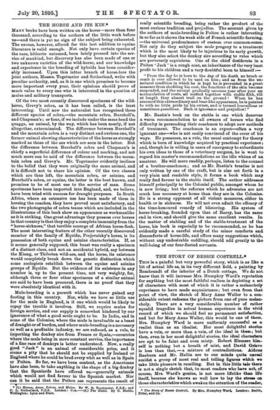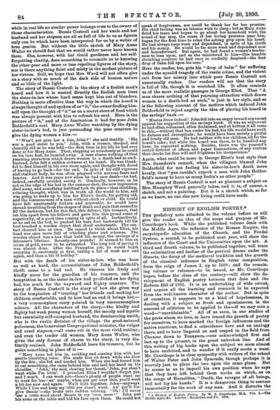THE STORY OF BESSIE COSTRELL.*
This is a painful but very powerful story, which is as like a bit of actual life as, in its very different field, a painting by Rembrandt of the interior of a Dutch cottage. We do not know that it will increase Mrs. Humphry Ward's reputation for anything but the most faithful realism in depicting a set of characters with most of which it is rather a melancholy experience to have made acquaintance; but even from that point of view, the sketch of Mary Anne Waller to a con- siderable extent redeems the picture from one of pure melan- choly. There are a very considerable number of rather squalid tragedies in actual human experience in the vivid record of which we should feel no permanent satisfaction, and but for Mary Anne Waller, this would be one of them. Mrs. Humphry Ward is more uniformly successful as a realist than as an idealist. Her most delightful stories have a vein, or more than a vein, of the ideal in them; but then, even in her most delightful stories, the ideal characters are apt to be faint and even misty. Robert Elsmere him- self is nothing but a breath of mist, and David Gzieve is less than that,— a mixture of contradictions. Aldo.= Raeburn and Mr. Hahn are to our minds quite unreal amidst a group of most real and telling figures which we take little pleasure in recalling. But in this little tale there is not a single sketch that to most readers who have not, of course, Mrs. Ward's genius, is not more lifelike than fife itself, because she knows so well how to lay the staves an those characteristics which awaken the attention of the reader, • The Story of Bessie Bedroll. By Mr% Humphry Ward, London; Blank, Elder, and Go.
while in real life no similar power belongs even to the owner of those characteristics. Bessie Costrell and her uncle and her husband and her stepson are all as full of life to us as figures only can be which have been interpreted for us by a writer of true genius. But without the little sketch of Mary Anne Waller we should feel that we would rather never have known them. She, however, with her timid goodness and her self- forgetting charity, does something to reconcile us to knowing the other poor and more or less repelling figures of the story, nor is there anything faint and misty in the modest picture of her virtues. Still, we hope that Mrs. Ward will not often give us a story with so much of the dark side of human nature and so little of the light.
The story of Bessie Costrell is the story of a foolish man's hoard and how it is wasted directly the foolish man loses the sister-in-law whose hard sense kept him out of blunders. Nothing is more effective than the way in which the hoard is always thought of and spoken of as "it," the owner feeding him- self upon the thought of "it" as on a secret store of food which was always present with him to refresh his soul. Here is the picture of "it," and of the fascination it had for poor John Bolderfield's soul. Mary Anne Waller watching by the dying sister-in-law's bed, is just persuading the poor creature to give the dying woman a kiss :—
"Won't yer give her a kiss, John P' she said timidly. She wor a good sister to you.' John, with a tremor, stooped, and clumsily did as he was told—the first time in his life he had ever done so for Mary Anne. Then, stepping as noiselessly as he could on his bare feet, he hurried away. A man shares nothing of that yearning attraction which draws women to a death-bed as such. Instead, John felt a sudden sickness at his heart. He was thank- ful to find himself in his own room again, and thought with dread of having to go back—for the end. In spite of his still vigorous and stalwart body, he was often plagued with nervous fears and fancies. And it was years now since he had seen death—he had, indeed, carefully avoided seeing it. Gradually, however, as he sat on the edge of his bed in the summer dark, the new impression died away, and something habitual took its place—that shielding, solacing thought, which was in truth all the world to him, and was going to make up to him for Eliza's death, for getting old, and the lonesomeness of a man without chick or child. He would have felt unutterably forlorn and miserable, he would have shrunk trembling from the shapes of death and pain that seemed to fill the darkness, but for this fact, this defence, this treasure, that set him apart from his fellows and gave him this proud sense of superiority, of a good time coming in spite of all. Instinctively, as he sat on the bed, he pushed his bare foot backwards till his heel touched a wooden object that stood underneath. The con- tact cheered him at once. He ceased to think about Eliza, his head was once more full of whirling plans and schemes. The wooden object was a box that held his money, the savings of a labourer's lifetime. Seventy-one pounds ! It seemed to him an ocean of gold, never to be exhausted. The long toil of saving it was almost done. After the Frampton job, be would begin enjoying it, cautiously at first, taking a bit of work now and again, and then a hit of holiday."
But with the death of his sister-in-law, who was keen as well as hard, the accumulations of John Bolderfield's thrift come to a bad end. He chooses his lively and kindly niece for the guardian of his treasure, and the temptation is, as the sister-in-law had predicted on her dying bed, too much for the wayward and flighty creature. The story of Bessie Costrell is the story of how she gives way to the temptation of "treating" her friends and making her children comfortable, and to how bad an end it brings her,— a very commonplace story painted in very nncommonplaoe colours. All the characters of the story,—the kindly and flighty but weak young woman herself, the moody and mystic but essentially self-occupied husband, the domineering smith, who is the rustic dictator of the village, the good-natured policeman, the benevolent Congregational minister, the vulgar and cruel stepson,—all come out in the most vivid outline ; and even the tender old woman, Mary Anne Waller, who gives the only flavour of charm to the story, is very dis- tinctly realised. John Bolderfield loses his treasure, but he gains something in place of it :— "Mary Anne led him in, scolding and coaxing him with her gentle trembling voice. She made him sit down while she blew up the fire ; she fed and tended him. When she had forced him to eat something, she came behind him and laid her hand on his shoulder. John,' she said, clearing her throat, John, yer shan't want while I'm livin'. I promised Eliza I wouldn't forget yer, and I won't. I can work yet—there's plenty of people want me to work for 'ern—an' maybe, when yer get over this, you'll work a bit too now and again. We'll hold together, John—anyways. While I live and keep my 'elth yer shan't want. An' yer'll for- give Bessie '—she broke into sudden sobbing. Oh! I'll never 'ear a crule word about Bessie in my 'ouse, never ! ' John put his arms on the table and hid his face upon them. He could not speak of forgiveness, nor could he thank her for her promise. His chief feeling was an intense wish to sleep ; but as Mary Anne dried her tears and began to go about her household work, the sound of her step, the sense of her loving presence near him, began for the first time to relax the aching grip upon his heart. He had always been weak and dependent, in spite of his thrift and his money. He would be far more weak and dependent now and henceforward. But again, he had found a woman's tender- ness to lean upon, and as she ministered to him—this humble shrinking creature he had once so cordially despised—the first drop of balm fell upon his sore."
Here the reader, too, gets his "drop of balm" for suffering under the squalid tragedy of the rustic crime, and the violent exit from her misery into which poor Bessie Costrell not unnaturally rashes. Our readers will see that the story is full of life, though it is wretched life. It often reminds us of the more realistic passages in George Eliot. That "A man shares nothing of that yearning attraction which draws women to a death-bed as such," is just in her style, and so is the following account of the motives which induced John Bolderfield to reject angrily the idea of placing his hoard in the savings' bank :—
"Muster Drew indeed! John fell into an angry inward argument against his suggestion of the savings bank. It was an argument he had often rehearsed, often declaimed, and at bottom it all came to this,—without that box under his bed, his life would have sunk to dulness and decrepitude ; he would have been merely a pitiful and lonely old man. He had neither wife nor children, all for the hoard's sake ; but while the hoard was there, to be handled any hour, he regretted nothing. Besides, there was the peasant's rooted distrust of offices, and paper transactions, of any routine that checks his free will and frightens his inexperience."
Again, what could be more in George Eliot's best style than Mrs. Saunders's remark, when the villagers blamed John Bolderfield for not feeling his sister-in-law's death more keenly, that "you couldn't expeck a man with John Bolder- field's money to have as many feelin's as other people." The story of Bessie Costrell is not as pleasant a subject as Mrs. Humphry Ward generally takes, and it is, of course, a sketch, and not a painting. But it is a sketch which, so far as we know, no one else now living could have made.



































 Previous page
Previous page